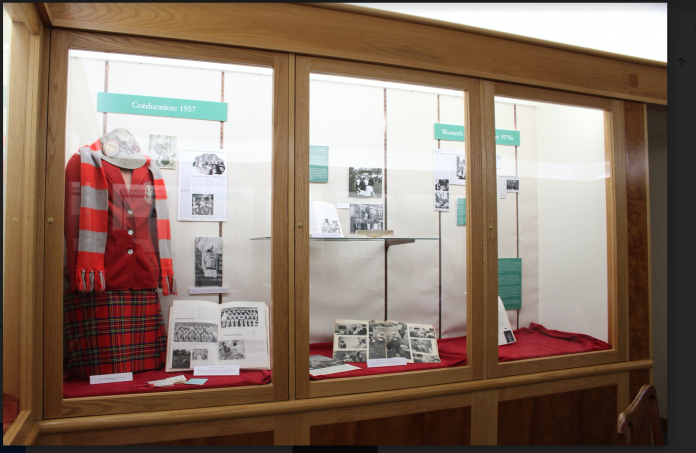One of Muhlenberg’s not-so-hidden gems is the College’s Special Collections and Archives, located in the Trexler Library. Students and faculty may be familiar with the main aspects of Special Collections: it houses all the College’s archives, as well as the Rare Book Collection. The College Archives include photos, memorabilia, graduation programs and even World War II correspondence from Muhlenberg servicemen. The other part of Special Collections and Archives is the Rare Book Collection, which houses a wide variety of works, from ancient cuneiform tablets and papyrus to Pennsylvania Dutch and German materials, as well as first or early editions of works by authors like Ernest Hemingway and Charles Dickens.
Susan Falciani Maldonado, Special Collections & Archive Librarian, explained, “The collection is broad, which makes for an excellent teaching collection because it covers so many areas.”
In addition to the archives, Special Collections and its staff are hard at work with several exciting projects. One such project happening through Special Collections is the exhibit An Innovation Revisited: 170 Years of Women on Campus, which goes along with the events that the History Department has been organizing for the 100-year anniversary of women’s suffrage. The exhibit opened last Thursday, and it will be up until Apr. 25. Planning for the exhibit began in the late summer, when Maldonado began looking through the College Archives for materials related to women’s suffrage at Muhlenberg. The catch — Muhlenberg was an all-male college at the time. As a result, the focus of the exhibit shifted: it would instead focus on the last 170 years of women at Muhlenberg by showcasing obscure pieces of women’s history that Maldonado has learned through the archives. This exhibit is earning Special Collections well-deserved attention, even getting coverage on the local news, Channel 69 WFMZ.
Arguably the most well-known fact about women’s history on campus is that co-education was achieved in 1957, but that was not the first time that women were a part of Muhlenberg’s history. The exhibit highlights the first female teachers and students, who were part of the Allentown Seminary (the predecessor to Muhlenberg) as early as the 1850s. Female faculty members also receive several moments of emphasis in the exhibit, from the first faculty members (who were librarians) to a professor who immigrated from Germany during the 1930s because she disagreed with the way her country was going to current president Harring, who is serving as the first female president of Muhlenberg. The exhibit also allows for people to “see the struggle of fifty years” (as Maldonado describes) through a whole section on the debate over co-education at Muhlenberg, including documents from people on both sides. Other women from Muhlenberg’s history highlighted in the exhibit are the first woman to receive a diploma from Muhlenberg (through the Allentown Seminary) in 1920 and an unknown African-American woman who appears in a photograph as part of the class of 1927 at the summer school. The stories of these women are just some of those who appear as part of the fascinating exhibit.
Another major project being worked on through Special Collections is spearheaded by Kristen Leipert, who is the Digital Projects Archivist for Special Collections. She has been working with the Bradbury-Sullivan LGBT Community Center in Allentown on the Lehigh Valley LGBTQ Archive. Putting together this archive, which is currently on display at the Bradbury-Sullivan Center but will come to Muhlenberg over spring break, was a collaborative effort with archivists at Lehigh University as well as at Bradbury-Sullivan. This panel exhibit uses Pride Guides, which cover the history of Pride in the Lehigh Valley. The information in the LGBTQ Archive was digitized by Robert Stinner ’20 over the summer, and now alumna Morgan Wolper ’19 is uploading the material for the archive. For the first time ever, the Lehigh Valley LGBTQ Archive had a table at Pride, so they were able to reach out to the community for materials for the archive. Leipert explained that this opportunity “starts people thinking about the things they have and their legacy.” Leipert and Maldonado said that the Lehigh Valley LGBTQ Archive served as a prime example of what they called “Archives as Activism,” in which materials are collected and shared and thus become a form of activism by “making local history for a community that was underserved.”
Special Collections and Archives also connects to the student body through several different courses at Muhlenberg, three of which are being offered this semester. The first of these is the Public Health course AIDS/HIV – Lehigh Valley, in which students gather information on the HIV/AIDS outbreak in a local context. Students learn archiving best practices by getting to look at the history through the Archives of FACT: Fighting AIDS Continuously Together, an organization that has supported people with AIDS without judgment since its founding in 1986.
The other courses working with Special Collections are the Integrated Learning courses Books and Their Readers and Printmaking and the Book. Students get to learn about who was reading and how they were reading all throughout history. Through the Printmaking course, they get paired with a rare book from the Rare Book Collection and create artist’s books, an art form that incorporates text, as well as displaying the art and rare book during the final week of the semester. Maldonado and Leipert help in several sessions of each of these courses. All three of these courses allow students to learn more about Special Collections at Muhlenberg, archiving as a profession and how to work with items in an archive.
Special Collections and Archives provides the Muhlenberg community with a wide range of opportunities and information, in particular with An Innovation Revisited: 170 Years of Women on Campus exhibit, which students, faculty and staff can check out in the Rare Books Room on Level B at Trexler Library during library business hours.






















